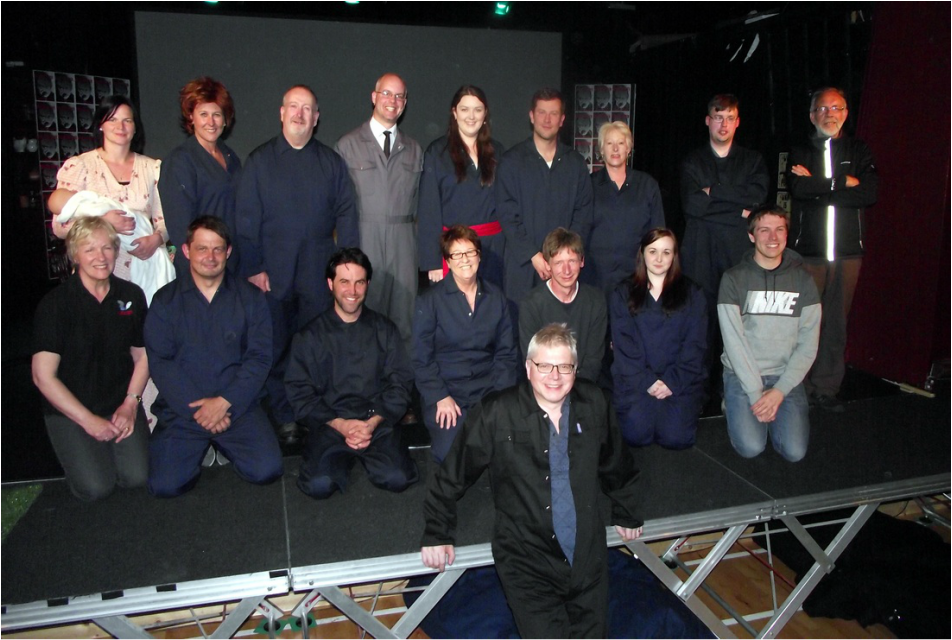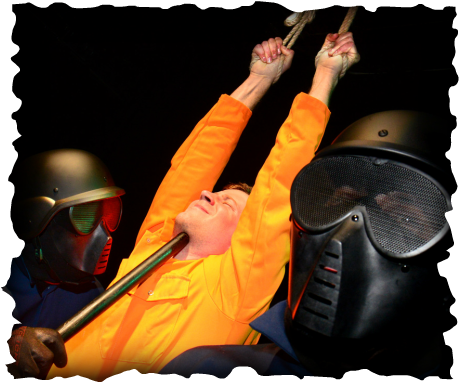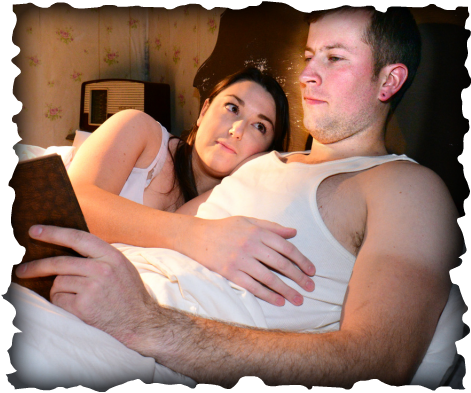George Orwell's 1984 adapted by Matthew Dunster
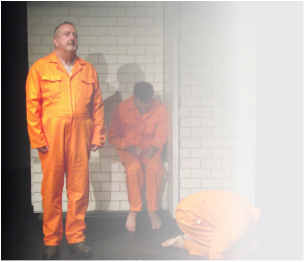
Thoughts from the Green Room
by Martin Cash
It's been nearly five months since I last wrote anything on here. Partly that is because I have a fairly boring life, as it happens, but mostly because any spare time in the last five months has been taken up with rehearsals for the BATS summer play, 1984 by George Orwell and adapted by Matthew Dunster. Not exactly the first thing that might spring to mind when wondering what to do for an evening’s entertainment, but the audience figures would tend to say otherwise.
Last night saw the end of a successful three night run and I can honestly say it has been one of the most enjoyable productions I have been involved with. “Enjoy” seems a strange word to use when talking about a play that features several vicious beatings, a depressing vision of a future totalitarian state and a second half devoted almost entirely to the torture of the main character, but the sheer professionalism of everyone involved meant that we all worked together to achieve an incredible end result where actors, scenery, props, make up and costumes were all of the highest order and were combined expertly to deliver a very powerful performance for our audiences to immerse themselves in.
I don’t know whether it is a reflection on am-dram in general, or the Kendal area in particular, but many comments were made that BATS seem to be the only group now prepared to tackle a serious and thought provoking drama like this (indeed, this was the very reason why Richard Sutton - who played Charington -wanted to be involved) - most groups opting for the “safe” option of light comedy or farce. Whilst I think these sorts of play are great entertainment, it is important that we should make people think now and again when they come to the theatre.
When George Orwell wrote the book in 1948, the Cold War had just started and Britain itself was still trying to recover from six long years of war. As we now know, serious consideration was given in 1945 to continuing the war in Europe, but this time taking on our erstwhile allies, the Russians. Sound familiar? Substitute Oceania, Eurasia and Eastasia with UK/USA, Russia and China and you get the point.
Thankfully, in 1945, sanity - or perhaps a realisation that such a war could not be won - prevailed and global conflict was avoided. But Orwell was remarkably prescient about a few other things. Barely any households had a TV set in 1948, but he accurately predicted how the “glowing box in the corner” would become a fixture in every household. It may be that the TV does not yet have the ability to see what we are doing in our own homes, but as soon as we step outside, CCTV, GPS tracking and ANPR cameras mean we can be “followed” wherever we go. “Newspeak” is surely just “txting” and in the Middle East recently we have seen ancient Babylonian carvings and statues being destroyed because they do not fit in with a particular groups view of history. “Control the past and you control the future”. And, without wishing to labour the point, there are many regimes around the world today where there is an elite ruling group (the Party) who impose their will on on the rest of the population (the Proles) by force and intimidation.
With regard to the play, it is always invidious to sing the praises of any one actor, but I think we really have to acknowledge the efforts of Adam Carruthers, who played the lead role of Winston Smith. Barely off the stage for the whole three hours he often had to deliver his lines whilst being kicked, beaten and strung up. The only chance he had for a rest was when he got to slip into bed with Julia (played by newcomer to BATS, Louise Bell) and even then he still had pages of dialogue to deliver! Of course, every “goodie” needs a “baddie” and Duncan Cramphorn was chillingly convincing as O’Brien, who firstly befriends and then betrays and tortures, Winston. Moving from “tender concern” to “vicious rage”, often in the space of one sentence, you truly felt the menace and evil lurking within the character.
Whilst those characters dominate the action of the play, mention must also be given to the supporting ensemble, most of whom played two or more characters. Not only that, but the Stage Crew were dressed like the cast so no skulking in the darkness for them as they were playing Proles, Guards and Party Members from time to time. Some of them even graduated to speaking parts, often delivering their lines with more poise than us “actors”!! Mind you, I did point out that they were now at the top of a slippery slope - twenty odd years ago, I answered the call to “help move a bit of scenery” and I’m still there now! (Gary and Stuart, you have been warned).
Obviously, there were still some who were beavering away in the darkness - Nigel on sound, Joe on Lighting and Dan on Video Projection - without whom the play just could not have been performed in the way it was. With cameo voiceovers and film appearances from Simon and Ron, it just goes to show how many people it actually needs to put on a production of this quality - and that’s without mentioning the whole Front of House team who worked tirelessly to publicise and promote.the play - even broadcasting live rehearsals by “Periscope” from time to time. Lastly, we should mention Fran on Prompt, though we heard very little from her. Which is a good thing!
As I said at the start, its been a long five months - we basically came straight out of five months rehearsing and performing the Pantomime into 1984. And as a Society is only as good as its last production, it will soon be time to start rehearsals for Showstoppers. More worryingly, there is only three months to go before we start again with Panto. For now though, I think those of us who have been involved with 1984 are just going to enjoy the luxury of of having a Sunday afternoon to ourselves. Oh wait, there is still the set to strip.........
Whilst I may not have mentioned everyone by name congratulations to all concerned. As this photo shows, that’s a pretty big cast and crew for a play that is basically about three characters!
by Martin Cash
It's been nearly five months since I last wrote anything on here. Partly that is because I have a fairly boring life, as it happens, but mostly because any spare time in the last five months has been taken up with rehearsals for the BATS summer play, 1984 by George Orwell and adapted by Matthew Dunster. Not exactly the first thing that might spring to mind when wondering what to do for an evening’s entertainment, but the audience figures would tend to say otherwise.
Last night saw the end of a successful three night run and I can honestly say it has been one of the most enjoyable productions I have been involved with. “Enjoy” seems a strange word to use when talking about a play that features several vicious beatings, a depressing vision of a future totalitarian state and a second half devoted almost entirely to the torture of the main character, but the sheer professionalism of everyone involved meant that we all worked together to achieve an incredible end result where actors, scenery, props, make up and costumes were all of the highest order and were combined expertly to deliver a very powerful performance for our audiences to immerse themselves in.
I don’t know whether it is a reflection on am-dram in general, or the Kendal area in particular, but many comments were made that BATS seem to be the only group now prepared to tackle a serious and thought provoking drama like this (indeed, this was the very reason why Richard Sutton - who played Charington -wanted to be involved) - most groups opting for the “safe” option of light comedy or farce. Whilst I think these sorts of play are great entertainment, it is important that we should make people think now and again when they come to the theatre.
When George Orwell wrote the book in 1948, the Cold War had just started and Britain itself was still trying to recover from six long years of war. As we now know, serious consideration was given in 1945 to continuing the war in Europe, but this time taking on our erstwhile allies, the Russians. Sound familiar? Substitute Oceania, Eurasia and Eastasia with UK/USA, Russia and China and you get the point.
Thankfully, in 1945, sanity - or perhaps a realisation that such a war could not be won - prevailed and global conflict was avoided. But Orwell was remarkably prescient about a few other things. Barely any households had a TV set in 1948, but he accurately predicted how the “glowing box in the corner” would become a fixture in every household. It may be that the TV does not yet have the ability to see what we are doing in our own homes, but as soon as we step outside, CCTV, GPS tracking and ANPR cameras mean we can be “followed” wherever we go. “Newspeak” is surely just “txting” and in the Middle East recently we have seen ancient Babylonian carvings and statues being destroyed because they do not fit in with a particular groups view of history. “Control the past and you control the future”. And, without wishing to labour the point, there are many regimes around the world today where there is an elite ruling group (the Party) who impose their will on on the rest of the population (the Proles) by force and intimidation.
With regard to the play, it is always invidious to sing the praises of any one actor, but I think we really have to acknowledge the efforts of Adam Carruthers, who played the lead role of Winston Smith. Barely off the stage for the whole three hours he often had to deliver his lines whilst being kicked, beaten and strung up. The only chance he had for a rest was when he got to slip into bed with Julia (played by newcomer to BATS, Louise Bell) and even then he still had pages of dialogue to deliver! Of course, every “goodie” needs a “baddie” and Duncan Cramphorn was chillingly convincing as O’Brien, who firstly befriends and then betrays and tortures, Winston. Moving from “tender concern” to “vicious rage”, often in the space of one sentence, you truly felt the menace and evil lurking within the character.
Whilst those characters dominate the action of the play, mention must also be given to the supporting ensemble, most of whom played two or more characters. Not only that, but the Stage Crew were dressed like the cast so no skulking in the darkness for them as they were playing Proles, Guards and Party Members from time to time. Some of them even graduated to speaking parts, often delivering their lines with more poise than us “actors”!! Mind you, I did point out that they were now at the top of a slippery slope - twenty odd years ago, I answered the call to “help move a bit of scenery” and I’m still there now! (Gary and Stuart, you have been warned).
Obviously, there were still some who were beavering away in the darkness - Nigel on sound, Joe on Lighting and Dan on Video Projection - without whom the play just could not have been performed in the way it was. With cameo voiceovers and film appearances from Simon and Ron, it just goes to show how many people it actually needs to put on a production of this quality - and that’s without mentioning the whole Front of House team who worked tirelessly to publicise and promote.the play - even broadcasting live rehearsals by “Periscope” from time to time. Lastly, we should mention Fran on Prompt, though we heard very little from her. Which is a good thing!
As I said at the start, its been a long five months - we basically came straight out of five months rehearsing and performing the Pantomime into 1984. And as a Society is only as good as its last production, it will soon be time to start rehearsals for Showstoppers. More worryingly, there is only three months to go before we start again with Panto. For now though, I think those of us who have been involved with 1984 are just going to enjoy the luxury of of having a Sunday afternoon to ourselves. Oh wait, there is still the set to strip.........
Whilst I may not have mentioned everyone by name congratulations to all concerned. As this photo shows, that’s a pretty big cast and crew for a play that is basically about three characters!
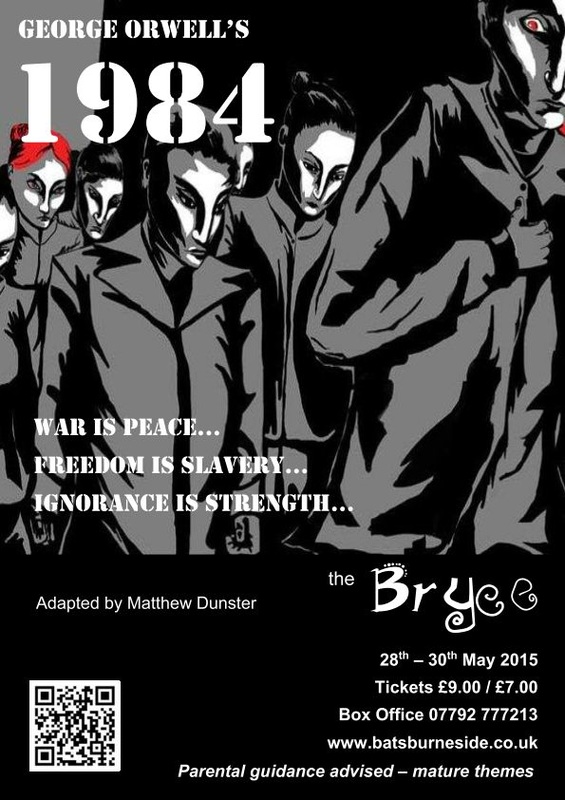
GEORGE Orwell's 1984 isn't everyone's cup of
tea.
Far from an upbeat, fluffy light classic, it paints a frightening picture of a sad society, where power rests with a select few who twist the truth, make the rules for all and create a monster - Big Brother, who is always watching.
BATS is a tight outfit, worthy of a repertory company. Pushing at the boundaries of what's feasible at am-dram level on a shoestring budget. At its core are some good actors and in Gordon Lawson a director with vision and ambition.
It's a breath of fresh air seeing a local society take on a play that's probably out of its comfort zone - and doing a terrific job of it too.
Adam Carruthers gave a fine performance as a thoughtful and considered Winston Smith, 1984's central character, a decent chap, who doubts the Party and what it stands for. He works as a clerk in the records department of the Ministry of Truth, where he basically erases history, revising and doctoring documents in step with the marching Party line.
Louise Bell was a subtle and confident Julia, who like her illicit lover Winston resents the Party.
Duncan Cramphorn as O'Brien was also outstanding, as a quietly-crazed Party official who slowly and excruciatingly dismantled Winston's sanity.
Martin Cash, Sue Cook, Helen Townson, Ron Milnes, Richard Sutton and Jen Armistead were all competent in their respective roles.
The sets were well thought out and inventive and props courtesy of Allyson Harkness and Gemma Martin brought Orwell's totalitarian state of Oceania to life in The Bryce.
Some of the scenes though in the first half seemed a little too short, occasionally confusing. The longer ones allowed the actors more time and space to settle and progress the story. Pre-recorded video inserts, projected images and lighting effects, gave the production a real cinematic feel.
And the film footage with Ron Milnes as The Brotherhood leader Goldstein was ingenious. While Winston lies in bed with Julia reading Goldstein's words from a book we don't hear Adam's voice but Goldstein's projected from a back screen spouting his prose.
Adapted for the stage by Matthew Dunster, the whole play is chilling from start to finish, brutal at times, particularly when Winston is tortured by O'Brien and eventually faces his worst fear in Room 101 - rats. Ultimately, Winston betrays Julia and ends up totally brainwashed.
"It's a beautiful thing, the destruction of words," Newspeak expert at the Ministry of Truth Syme (Sue Cook) tells Winston, while sat at the canteen table explaining the eleventh edition of the dictionary and how they're cutting the English language down, ditching "vague and useless words" like excellent and splendid. "If you have a word like good what need is there for a word like bad? Ungood will do just as well."
Scary stuff.
Adrian Mullen - The Westmorland Gazette
Far from an upbeat, fluffy light classic, it paints a frightening picture of a sad society, where power rests with a select few who twist the truth, make the rules for all and create a monster - Big Brother, who is always watching.
BATS is a tight outfit, worthy of a repertory company. Pushing at the boundaries of what's feasible at am-dram level on a shoestring budget. At its core are some good actors and in Gordon Lawson a director with vision and ambition.
It's a breath of fresh air seeing a local society take on a play that's probably out of its comfort zone - and doing a terrific job of it too.
Adam Carruthers gave a fine performance as a thoughtful and considered Winston Smith, 1984's central character, a decent chap, who doubts the Party and what it stands for. He works as a clerk in the records department of the Ministry of Truth, where he basically erases history, revising and doctoring documents in step with the marching Party line.
Louise Bell was a subtle and confident Julia, who like her illicit lover Winston resents the Party.
Duncan Cramphorn as O'Brien was also outstanding, as a quietly-crazed Party official who slowly and excruciatingly dismantled Winston's sanity.
Martin Cash, Sue Cook, Helen Townson, Ron Milnes, Richard Sutton and Jen Armistead were all competent in their respective roles.
The sets were well thought out and inventive and props courtesy of Allyson Harkness and Gemma Martin brought Orwell's totalitarian state of Oceania to life in The Bryce.
Some of the scenes though in the first half seemed a little too short, occasionally confusing. The longer ones allowed the actors more time and space to settle and progress the story. Pre-recorded video inserts, projected images and lighting effects, gave the production a real cinematic feel.
And the film footage with Ron Milnes as The Brotherhood leader Goldstein was ingenious. While Winston lies in bed with Julia reading Goldstein's words from a book we don't hear Adam's voice but Goldstein's projected from a back screen spouting his prose.
Adapted for the stage by Matthew Dunster, the whole play is chilling from start to finish, brutal at times, particularly when Winston is tortured by O'Brien and eventually faces his worst fear in Room 101 - rats. Ultimately, Winston betrays Julia and ends up totally brainwashed.
"It's a beautiful thing, the destruction of words," Newspeak expert at the Ministry of Truth Syme (Sue Cook) tells Winston, while sat at the canteen table explaining the eleventh edition of the dictionary and how they're cutting the English language down, ditching "vague and useless words" like excellent and splendid. "If you have a word like good what need is there for a word like bad? Ungood will do just as well."
Scary stuff.
Adrian Mullen - The Westmorland Gazette
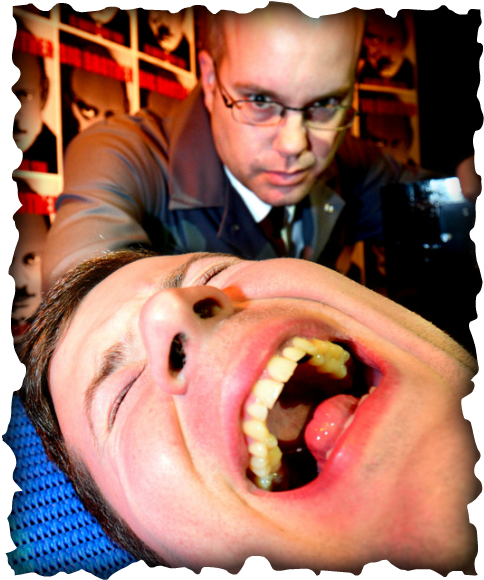
GEORGE Orwell's 1984 portrays a dystopian society, controlled by an oligarchical government, where a select few make the rules for all.
Power and control rule the day.
When Orwell wrote his novel in 1948 he painted a frightening picture of how the world could be in years to come.
Adapted for theatre by Matthew Dunster, Burneside Amateur Theatrical Society's next production brings Orwell’s chilling vision of Big Brother and the totalitarian state of Oceania to The Bryce stage from May 28-30.
And director Gordon Lawson says 1984 is definitely the society's most challenging production to date. "It's not just the human themes of love and betrayal having to be acted out by the cast, but the technical requirements of live video feeds, recorded video inserts, projection and lighting effects, all having to be controlled by a talented bunch of techies behind the scene. "The production is looking great at this stage," adds Gordon, "with actors really getting into the dialogue and, more critically, the emotion of the piece.
"It's a big ask for amateur performers to push them to deliver Orwell's vision of forbidden love within his totalitarian world, and the tragic aftermath of the discovery of Winston and Julia's relationship.
"But deliver they do, together with the rest of a talented amateur cast."
Adam Carruthers takes the role of Winston, Julia is played by Louise Bell and Duncan Cramphorn plays the part of O'Brien.
From The Westmorland Gazette - written by Adrian Mullen
Power and control rule the day.
When Orwell wrote his novel in 1948 he painted a frightening picture of how the world could be in years to come.
Adapted for theatre by Matthew Dunster, Burneside Amateur Theatrical Society's next production brings Orwell’s chilling vision of Big Brother and the totalitarian state of Oceania to The Bryce stage from May 28-30.
And director Gordon Lawson says 1984 is definitely the society's most challenging production to date. "It's not just the human themes of love and betrayal having to be acted out by the cast, but the technical requirements of live video feeds, recorded video inserts, projection and lighting effects, all having to be controlled by a talented bunch of techies behind the scene. "The production is looking great at this stage," adds Gordon, "with actors really getting into the dialogue and, more critically, the emotion of the piece.
"It's a big ask for amateur performers to push them to deliver Orwell's vision of forbidden love within his totalitarian world, and the tragic aftermath of the discovery of Winston and Julia's relationship.
"But deliver they do, together with the rest of a talented amateur cast."
Adam Carruthers takes the role of Winston, Julia is played by Louise Bell and Duncan Cramphorn plays the part of O'Brien.
From The Westmorland Gazette - written by Adrian Mullen
BURNESIDE Amateur Theatrical Society is pushing at the dramatic boundaries yet again - this time around staging George Orwell’s 1984.
Adapted for the stage by Matthew Dunster, the BATS production will run from May 28-30 and director Gordon Lawson is looking for actors prepared to push the boundaries in this challenging play.
From the opening scenes in a drab "Ingsoc" office where lead character Winston Smith exists as an editor of historical revisionism, through his love affair with Julia during clandestine meetings, his intellectual rebellion against the Party and his subsequent imprisonment, inquisition and torture, Gordon says "the play will challenge both actors and audience."
These days the phrases of Orwell's book may have lost their precise meaning as they passed into common language but such words as Newspeak, Doublethink, Room 101 and Thought Police still take on a chilling reality.
In the society that Orwell describes, every citizen is under constant surveillance by the authorities, mainly by telescreens (except for the Proles). The people are constantly reminded of being observed by the now infamous phrase "Big Brother is watching you."
Big Brother is the enigmatic dictator of Oceania, a totalitarian state where the ruling Party wields total power over the inhabitants.
Orwell's 1984 portrays a dystopian society, controlled by an oligarchical government, where a few powerful people make the rules for all. It is all about power and control.
In its own day it was considered a visionary and futuristic novel, which when Orwell wrote it in 1948 painted a frightening picture of how the world would be in years to come.
Adapted for the stage by Matthew Dunster, the BATS production will run from May 28-30 and director Gordon Lawson is looking for actors prepared to push the boundaries in this challenging play.
From the opening scenes in a drab "Ingsoc" office where lead character Winston Smith exists as an editor of historical revisionism, through his love affair with Julia during clandestine meetings, his intellectual rebellion against the Party and his subsequent imprisonment, inquisition and torture, Gordon says "the play will challenge both actors and audience."
These days the phrases of Orwell's book may have lost their precise meaning as they passed into common language but such words as Newspeak, Doublethink, Room 101 and Thought Police still take on a chilling reality.
In the society that Orwell describes, every citizen is under constant surveillance by the authorities, mainly by telescreens (except for the Proles). The people are constantly reminded of being observed by the now infamous phrase "Big Brother is watching you."
Big Brother is the enigmatic dictator of Oceania, a totalitarian state where the ruling Party wields total power over the inhabitants.
Orwell's 1984 portrays a dystopian society, controlled by an oligarchical government, where a few powerful people make the rules for all. It is all about power and control.
In its own day it was considered a visionary and futuristic novel, which when Orwell wrote it in 1948 painted a frightening picture of how the world would be in years to come.

